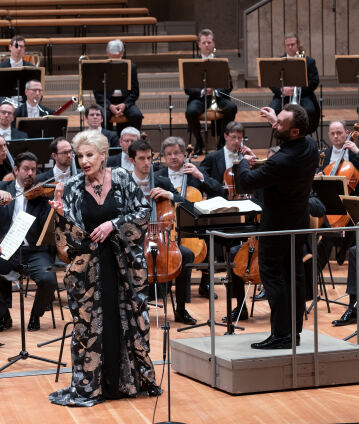Kirill Petrenko conducts Tchaikovsky’s “Queen of Spades”

No opera demonstrates more vividly than Tchaikovsky’s The Queen of Spades the fact that people’s desires are often their undoing. The outsider Herman strives for success at cards but loses everything in the end. Lisa searches for her great love, is disappointed and takes her life. There is also a mysterious countess. Kirill Petrenko conducts the passionate music Tchaikovsky composed for this dark tale.
As an oppressive character study and insight into the darkness of gambling addiction, Alexander Pushkin’s The Queen of Spades is one of the master narratives of the 19th century. The male protagonist of the story is Hermann, a soldier who is orderly, thrifty and at the same time driven by inner demons. He hears about a countess who is said to guard a valuable secret: she is supposed to know the magic sequence of cards that guarantees that a player will win at games of chance. Hermann gains access to the old lady’s house by pretending to be in love with her foster daughter Lisa. When he threatens the countess with a pistol to get the secret from her, she dies of a heart attack. Later, however, the countess’s ghost finally reveals the (supposedly) lucky cards to Hermann. With the first two, the soldier wins a fortune, but with the last one – from which the titular Queen of Spades seems to sneer at him – he gambles it all away.
In the libretto, written by Tchaikovsky’s brother Modest, Hermann really loves Lisa, and while Pushkin at least lets them escape with their lives, in the opera they both commit suicide. The result is the tragic story of an unfulfillable desire, which also reflects Tchaikovsky’s own fate: as a homosexual, he was unable to find lasting happiness in love within the social conventions of the time.
The conclusion of Kirill Petrenko’s three-part cycle of Tchaikovsky’s operas features Arsen Soghomonyan as Hermann, and soprano Elena Stikhina as Lisa. The contralto Doris Soffel returns to the orchestra as the Countess.
© 2022 Berlin Phil Media GmbH
Category
Artists
Our recommendations
- Kirill Petrenko with Rachmaninov’s “Francesca da Rimini”
- Kirill Petrenko conducts Tchaikovsky’s “Queen of Spades” in Baden-Baden
- Kirill Petrenko conducts Strauss’s “Elektra” at the Easter Festival in Baden-Baden
- Kirill Petrenko with Strauss’s “Die Frau ohne Schatten” in Baden-Baden
- Kirill Petrenko conducts Tchaikovsky’s “Mazeppa”
- Mozart’s “Magic Flute” from Baden-Baden